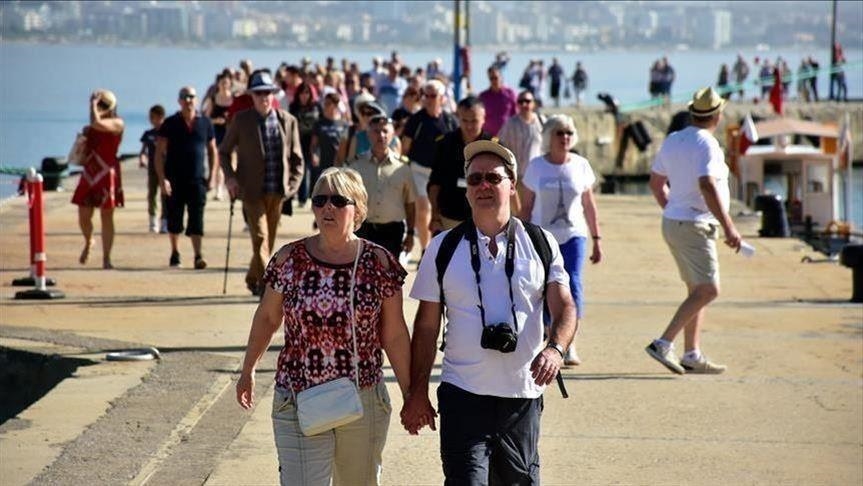Bush Vows To Democratize Mideast Countries
"Our commitment to democracy is being tested in the Middle East, " Bush told the Washington-based National Endowment for Democracy.
With a defiant tone and glaring eyes, Bush said the wave of democracy barely reached the Arab countries, citing the latest Arab development report which called for more freedoms to take roots in the region.
The advance of freedom in the Middle East, which Bush said had witnessed many dictatorships since the end of the colonial era, is "the calling of our time and our country".
He repudiated the U.S. policy of helping iron-handed regimes in the Middle East, saying the 9-11 attacks showed the failure of efforts to use such governments as bulwarks against extremism.
"Sixty years of Western nations excusing and accommodating the lack of freedom in the Middle East did nothing to make us safe, because in the long run stability cannot be purchased at the expense of liberty," he admitted.
"As long as the Middle East remains a place where freedom does not flourish, it will remain a place of stagnation, resentment, and violence ready for export," Bush argued.
"And with the spread of weapons that can bring catastrophic harm to our country and to our friends, it would be reckless to accept the status quo," he said.
‘Need For Change’
The American president said some governments in the Middle East and North Africa were "beginning to see the need for change", citing Morocco, Bahrain, Oman and Yemen.
The lack of freedom in many Middle Eastern countries had terrible consequences for the peoples of those countries, Bush said, blaming it for poverty and women oppression.
He argued that it would be reckless to accept the status quo, asserting that the U.S. "has adopted a new policy, a forward strategy of freedom in the Middle East."
"Iraqi democracy will succeed, and that success will send forth the news, from Damascus to Tehran, that freedom can be the future of every nation," Bush said.
"The establishment of a free Iraq at the heart of the Middle East will be a watershed event in the global democratic revolution," he contended.
The American president charged that dictators in Syria had "left a legacy of torture, oppression, misery and ruin", asking Iran to enlarge the margin of popular participation.
In an implicit reference to Libyan leader Muammar Gaddafi, Bush criticized leaders in the region who still harbor socialism to justify their control over their countries.
He also took swipe at Palestinian President Yasser Arafat, although he did not name him.
Palestinian leaders who block reform, encourage violence and spread hatred are not leaders at all, Bush said, echoing previous charges that Arafat was instigating violence against Israeli occupation forces in the Palestinian territories.
But he made no mention of Israel or the conflict, only saying that democracy will lead the world to peace.
Underlining that "Islam is consistent with democratic rule", Bush charged that it was abused to secure total control for political ends.
He asserted that to say Islam and democracy were incompatible was "cultural condescension", praising Muslims as good citizens.
Egypt To Take Lead
Bush singled out Egypt and Saudi Arabia, two key Washington’s allies, for his request, warning that political stagnation, resentment and violence have become the mantra of the region.
He was keen to call on Cairo to lead the Middle East to democracy, stressing that governments need to confront real problems.
As it had shown the region the path to peace, Egypt should show it the road to democracy, as democracies protect freedom rather than selecting from the law and punishing opponents, he said.
U.S. Secretary of State Colin Powell had earlier said he hoped Egypt would spend some of the American economic aid on the purposes detailed in the new initiative to boost democracy and civil society organizations.
The statements came few days before the arrival in Cairo of U.S. Deputy Secretary of State Richard Armitage, the man responsible for the Middle East initiative for launching reforms in the region.
Powell announced in December last year a 29-million-dollar initiative to foster "democracy" in the Middle East.
The plan, entitled the U.S.-Middle East Partnership Initiative, "will provide funding and a framework for the U.S. to work together with governments and people in the Arab world to expand economic, education and political opportunity," said the State Department.
Repeated Calls
Observers said Bush’s statements are not new, but this time they are carried more harshly – may be against the backdrop of the occupation of Iraq and the growing threats to Iran and Syria.
"They are sending out the same message that the U.S. is leading the world," said Hossam El-Sayyed, an Egyptian analyst, citing Bush’s boastful words that his country had helped create conditions for democracy to flourish.
El-Sayyed noted that the speech – announced by Washington just one day before – put all U.S. calls for reforms "in an official form, and for first time categorized the Middle East countries according to their own behavior."
Others described the speech as a response to accusations that Washington’s interest in the region are oil and support of Israel, while showing indifference to the aspirations of Arab people for liberty.
But Bush’s confidence that democracy in Iraq will culminate in success raised suspicions, with spiraling resistance attacks against American forces and mounting anti-American sentiments among Iraqis.
But others said Arab countries are already taking Washington’s calls for reform more seriously.
Egypt recently announced the launch of a national dialogue between the ruling National Democratic Party and opposition parties and the abolishment of military rulings as well as the nullification of emergency state security courts.



